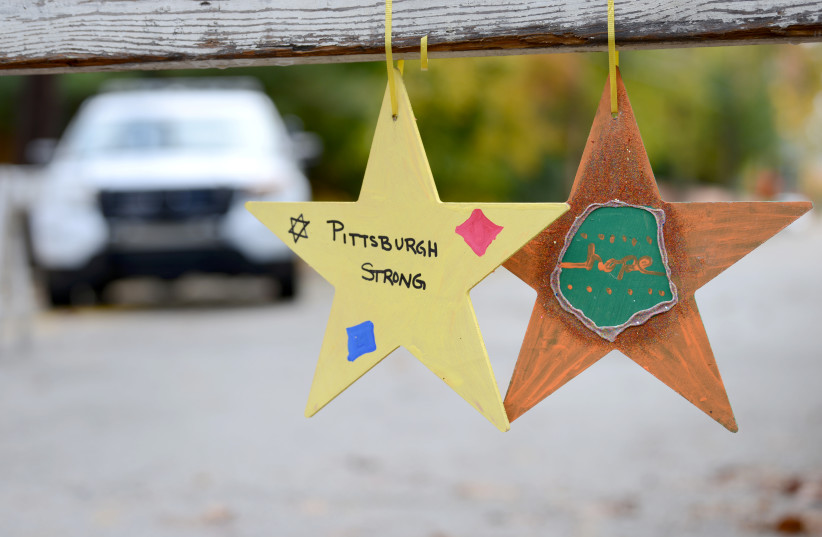Defense attorneys in the trial of the Pittsburgh synagogue shooter will not be calling witnesses or presenting evidence in court, following 11 days of harrowing testimony from witnesses called by the prosecution.
The defense attorneys’ choice underscores their acknowledgement that their client committed the attack. Since the beginning of the trial, lead defense attorney Judy Clarke has made clear that her goal is to prevent the shooter, Robert Bowers, from being sentenced to death.
Judge Robert Colville dismissed the jury on Wednesday and told jurors to return on Thursday to hear closing arguments, after which the jury will deliberate and deliver its verdict. The defendant is almost certain to be found guilty, and his sentence — which will be determined in the next phase of the trial — will depend on whether the jury finds him guilty on all 63 counts he faces or just some of them. Of those charges, 22 carry the death penalty — two for each of his 11 victims.
The anticlimactic conclusion of the proceedings on Wednesday followed 11 days of graphic testimony from congregants and emergency responders who were present when the gunman perpetrated the shooting in Pittsburgh’s Squirrel Hill neighborhood on Oct. 27, 2018. The synagogue he attacked housed three congregations: Tree of Life, New Light and Dor Hadash.
Witnesses have described how the shooting unfolded, detail by tragic detail — and have explained the Jewish rituals and practices interrupted and desecrated by the attack. Other witnesses, including 911 call center employees and law enforcement, have recounted how they responded to the shooting.

Details of the trial
Clarke and her team have cross-examined witnesses but revealed on Thurday that they would not be calling any of their own.
“We have no evidence,” Clarke said after Colville turned to her following the prosecution’s last witness. In her opening remarks on May 30, Clark had said that the defense team would not contest that its client committed the shooting.
“There is no disagreement, there is no dispute and there will be no doubt as to who shot the 11 congregants,” she said then. “On Oct. 27, 2018, Robert Bowers, the man seated at that table, loaded with ammunition and firearms entered the synagogue.”
Clarke is famous for keeping her clients off of death row and hopes to achieve the same result here. Her argument to jurors is that her client targeted the congregants not because of their religion, but because of a delusion that they were facilitating an immigration invasion to replace white people.
“We can at least do our best to uphold the rule of law by figuring out, to the best of our ability, what were Mr. Bowers’ motives and intent,” Clarke said in her opening statement.
The prosecution wrapped up its case before lunch on Wednesday with testimony from Andrea Wedner, one of two worshippers who were injured by gunfire in the shooting and survived. Wedner was with her mother, Rose Mallinger, when the gunman entered the chapel. Mallinger, who was 97, was killed in the attack.
Acting US Attorney Troy Rivetti asked Wedner if the gunman had kept her from worshipping — the same question the prosecution has posed to other survivors who took the stand.
That question is key to half of the 22 capital charges the gunman faces: Federal law allows the death penalty in cases “of obstruction in free exercise of religious belief resulting in death.” The other 11 capital charges are for hate crimes resulting in death.
“Did you go there to worship and pray?” Rivetti asked Wedner. “Did the defendant prevent you from praying? Did the defendant come into the chapel and shoot you? Your mother, Rose Mallinger, who prayed the prayer for peace each week, was shot right next to you?”
Wedner answered “Yes” each time, with increasing emotion.
The defense rarely objected during the trial, only doing so to argue that testimony was inappropriately veering into how American Jews worship, or into what animates Jewish practice. Nearly all of the defense’s objections during the trial were overruled.
After the jury exited the courtroom on Wednesday, the defense continued arguing that their client did not seek to kill Jews while they worshipped. Speaking before the judge, defense attorneys raised objections to the phrasing of some of the charges the jury would consider.
They tried, as they had previously, to have the words “willfully” and “because of actual or perceived religion” removed from the 11 capital charges that have to do with obstruction of worship resulting in death. Colville overruled the objections.
Wedner asked not to be on the stand when the prosecution played back her 911 call from the day of the shooting in court. Instead, Rivetti asked her a series of questions about the call before she left the chamber.
“Have you actually requested that we not play that 911 call while you’re on the stand?” Rivetti asked.
“Yes,” Wedner said.
“Is that because you can hear yourself being shot?”
“Yes.”
“Is it because you can hear your mother’s quiet voice as you try to comfort her?”
“Yes.”
“Is it because you can hear her being shot?”
“Yes.” Wedner’s voice cracked.
The recording of the call played out as Rivetti had described: Werner’s whispered pleadings to a 911 operator, silence, and then two gun blasts and screams. Rivetti stopped the replay about halfway through the 9-minute recording.
During her testimony, Wedner described sensing police were in the sanctuary, and moving her legs to signal she was alive. “They were in fatigues so I knew they were the good guys,” she said.
She rose and realized she was the lone survivor in the sanctuary where the Tree of Life congregation regularly convened.
Before she left, she bid her mother goodbye.
“I kissed my fingers and I touched my fingers to her skin,” she said. “I cried out, ‘Mommy.'”
